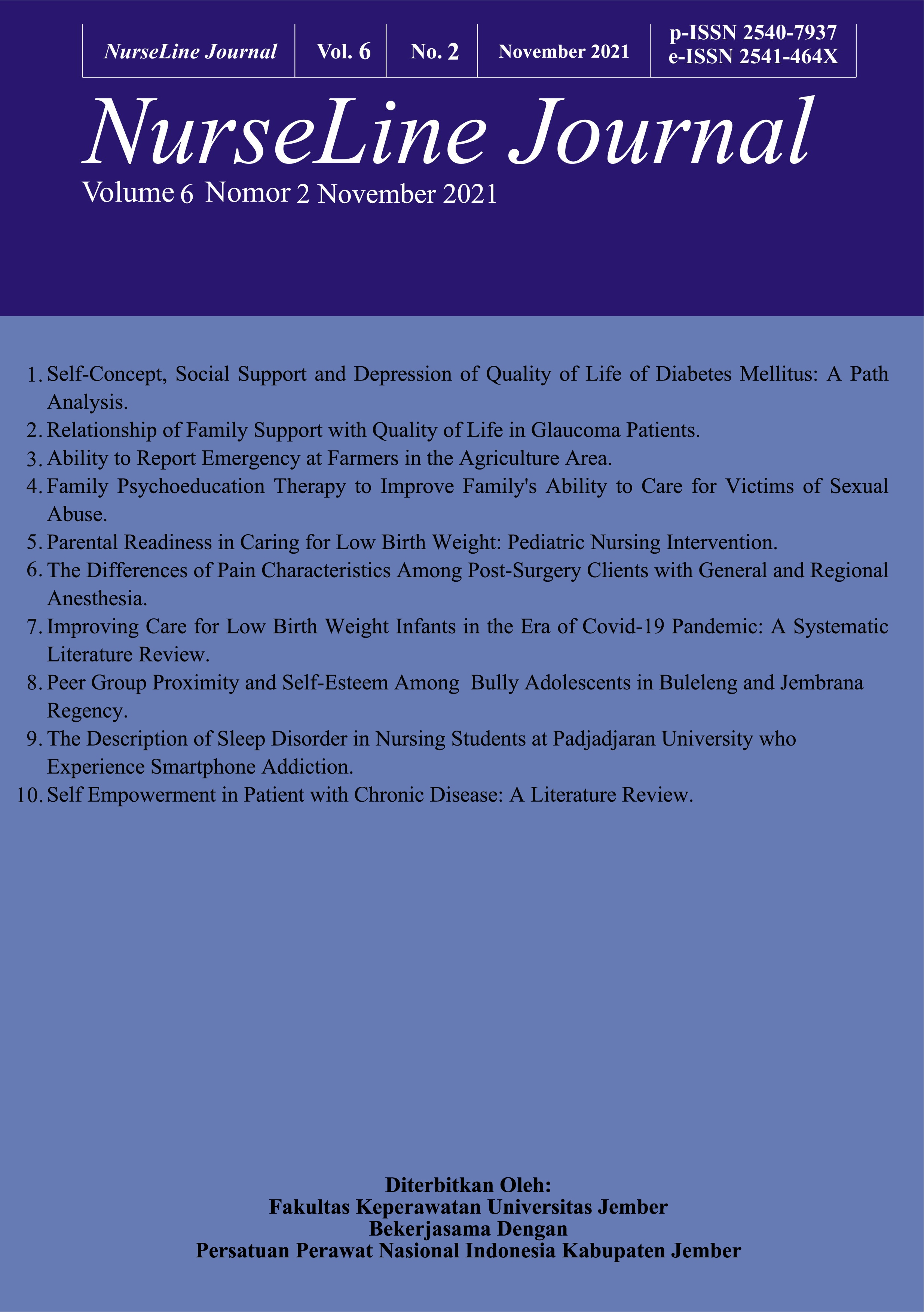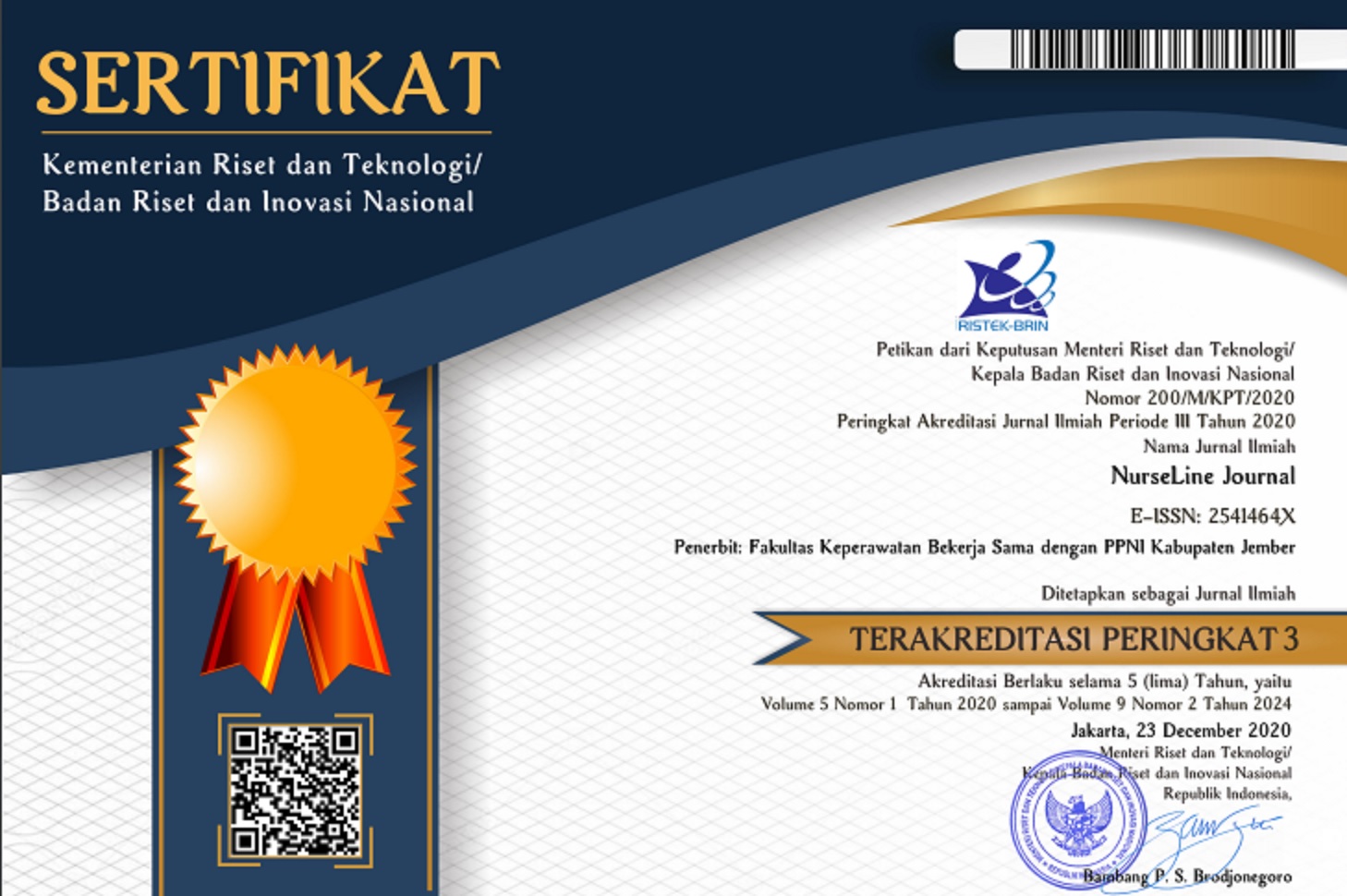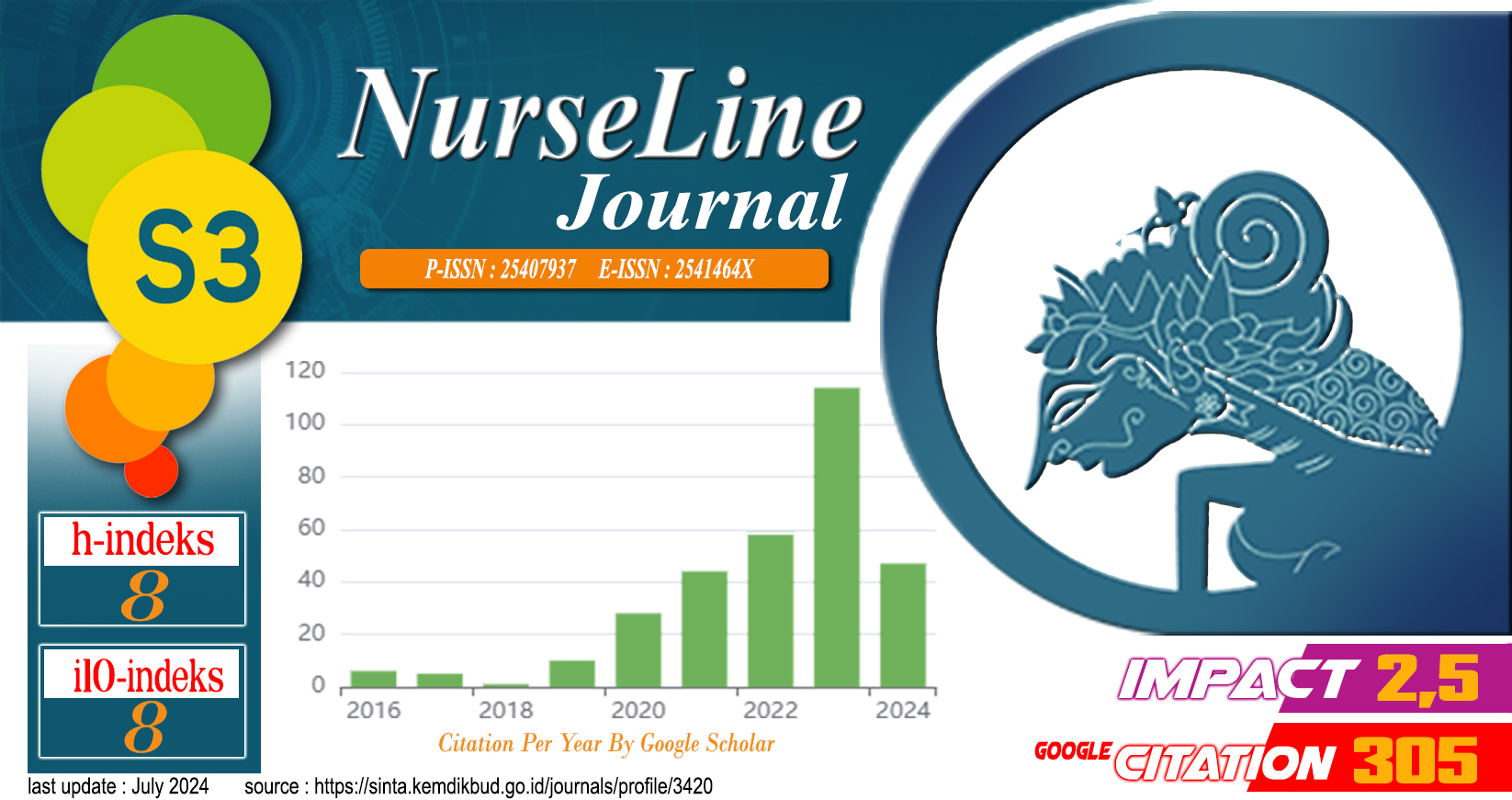The Differences of Pain Characteristics Among Post-Surgery Clients with General and Regional Anesthesia
Abstract
Background: Surgery is one of the medical options for improving health. Surgery will break the main chain that causes health problems. Patients undergoing surgery will receive anesthetic management to relieve pain sensations. Pain sensations will be felt again after the period of anesthesia gradually disappears. Post-surgery clients will feel pain that varies widely. Purpose: This study aims to determine differences in the characteristics of postoperative client pain with general anesthesia and regional anesthesia. Methods: The method used was observational in postoperative clients with a cross-sectional design. Pain characteristics were observed after 4 hours postoperatively. Observation of pain used a pain characteristic observation sheet with observation items including pain intensity, pain onset, pain quality, and pain coping pattern. Observations were made on 30 postoperative clients with general anesthesia and 30 postoperative clients with regional anesthesia. The pain characteristics of the two groups after surgery were compared and the differences were seen. Result: The results of the study generally showed that the characteristcis of postoperative client pain with regional anesthesia (mean score = 18.1) were heavier than clients who received general anesthesia (mean score = 17.5). The results of the Mann Whitney test showed that the value of p = 0.000 (pain scale), p = 0.017 (pain time range), 0.000 (pain onset), p = 0.018 (pain intensity), p = 0.000 (pain depth), p = 0.000 (coping pattern). Conclusion: There are differences in pain characteristics between postoperative clients with general anesthesia and regional anesthesia on the aspects of pain scale, pain onset, the intensity of pain, depth of pain, and coping patterns of pain. The length of time of surgery and the level of depth of the surgical incision have a very significant effect on the characteristics of postoperative pain.
References
Berry, D. J., & Lieberman, J. (2019). Surgery of The Hip E-Book (2nd ed.). Elsevier Halth Sciences.
Buvanendran, A. (2011). Post-Operative Pain; Research From A. Buvanendran and Co-Author Reveals New Finding on Post-Operative Pain. NewsRx.
Donauer, K., Bomberg, H., Wagenpfeil, S., Volk, T., Meissner, W., & Wolf, A. (2018). Regional vs. General Anesthesia for Total Knee and Hip Replacement: An Analysis of Postoperative Pain Perception from the International PAIN OUT Registry. Pain Practice. https://doi.org/10.1111/papr.12708
Franco, L. V. de S., Sugai, R. F. B., Silva, S. C. e, Silva, T. de C. da, Silva, R. B. V., Guimarães, R. S. de S., Cerdeira, C. D., & Santos, G. B. (2017). Postoperative pain at a university hospital: perspectives toward health promotion. Revista Brasileira Em Promocao Da Saude.
Greimel, F., Maderbacher, G., Zeman, F., Grifka, J., Meissner, W., & Benditz, A. (2017). No Clinical Difference Comparing General, Regional, and Combination Anesthesia in Hip Arthroplasty: A Multicenter Cohort-Study Regarding Perioperative Pain Management and Patient Satisfaction. Journal of Arthroplasty. https://doi.org/10.1016/j.arth.2017.05.038
kılıc, ertugrul. (2019). Laminektomi operasyonu olan ileri yaş hastalarda genel anestezi ile spinal anestezinin postoperatif ağrı ve analjezik tüketimi üzerine etkileri: retrospektif deneyimlerimiz. Dicle Tıp Dergisi. https://doi.org/10.5798/dicletip.420540
Layzell, M. (2014). Rectus sheath catheter infusions for post-operative pain management. Nursing Standard (Royal College of Nursing (Great Britain) : 1987). https://doi.org/10.7748/ns.28.42.37.e8617
Lubin, M. F., Smith, R. B., Dodson, T. F., Spell, N. O., & Walker, H. K. (Eds.). (2010). Medical Management of The Surgical Patient: A Textbook of Perioperative Medicine. Cambridge University Press.
Luo, J., & Min, S. (2017). Postoperative pain management in the postanesthesia care unit: An update. In Journal of Pain Research. https://doi.org/10.2147/JPR.S142889
Málek, J. (2019). Perioperative pain management. Klinicka Farmakologie a Farmacie. https://doi.org/10.36290/far.2019.012
Mariotti, N. A. (2013). Drain’s Perianesthesia Nursing: A Critical Care Approach. AORN Journal. https://doi.org/10.1016/j.aorn.2013.01.004
Naghibi, K., Saryazdi, H., Kashefi, P., & Rohani, F. (2013). The comparison of spinal anesthesia with general anesthesia on the postoperative pain scores and analgesic requirements after elective lower abdominal surgery: A randomized, double-blinded study. Journal of Research in Medical Sciences.
Rothrock, J. C., & McEwen, D. R. (Eds.). (2015). Alexander’s Care of The Patient in Surgery E-Book (15th ed.).
Slikker, W., Wang, C., & Paule, M. G. (2018). Handbook of developmental neurotoxicology. In Handbook of Developmental Neurotoxicology. https://doi.org/10.1016/C2015-0-04830-4
Smeltzer, suzanne C., Bare, B. G., Hinkle, J. L., & Cheever, kerry H. (2012). Brunner & Suddarth’s textbook of medical-surgical nursing. — 12th ed. /. In Journal of Chemical Information and Modeling.
Wang, X. X., Zhou, Q., Pan, D. B., Deng, H. W., Zhou, A. G., Guo, H. J., & Huang, F. R. (2016). Comparison of Postoperative Events between Spinal Anesthesia and General Anesthesia in Laparoscopic Cholecystectomy: A Systemic Review and Meta-Analysis of Randomized Controlled Trials. BioMed Research International. https://doi.org/10.1155/2016/9480539

This work is licensed under a Creative Commons Attribution-ShareAlike 4.0 International License.
















